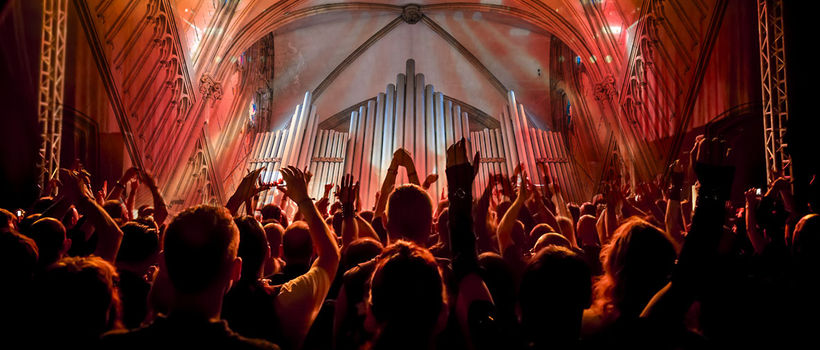 Matthew’s Question to Madison: Since you’re taking a Worship and Liturgy course, tell us what you’re learning about, specifically, corporate worship.
Matthew’s Question to Madison: Since you’re taking a Worship and Liturgy course, tell us what you’re learning about, specifically, corporate worship.
Of all the questions I could be answering for this week’s blog, this would be on the upper end of being the hardest. I’m five weeks into a Worship and Liturgy course, and I feel like my entire perspective is being challenged and transformed. Which is an amazing journey to be going through right now – but my thoughts are so jumbled and not clear yet, that writing out the things I’ve been learning and thinking about is rather difficult at this point.
So bear with me as I write out general thoughts that I hope are semi-coherent.
First off, I didn’t realize how deeply rooted the idea that worship was only music was in my mind. My generation seems to be very (emotionally) musically driven, so maybe that’s why. Or perhaps it’s because from the stage during a church service we “stand for worship” as the band begins the next “worship song”.
But preaching, communion, confession, thanksgiving, and prayer are all worship elements in a corporate worship gathering.
I’ll be honest, before I entered the course last month, I was at a place where going to church was a checklist item. Since I work at the same place I call ‘church’, I’m in the building a lot, and when Saturday evening rolled around, I wanted different scenery. Human desires, eh.
And prior to that, corporate worship was more of a reset button – realign my mind and heart with Christ since, as many of us have probably experienced, it starts to stray once we leave the building. And there’s nothing wrong with it being a reset button. We absolutely do need to renew our minds and center our hearts on our Creator, and corporate worship is one of the great places for that.
But, wow, it’s so much more than that.
The course is, in the simplest explanation, broken down into two components – how we worship, and who we worship.
My structured brain really appreciates the ‘how’ – lay out for me what to do and convince me of why, and I will gladly go do it. But the substance of the structure of worship experience can only come from the ‘who’.
Everything involved in the corporate worship service involves an invitation from God. God invites me into connecting with Him through the lyrics sung out; God invites me into hearing His Word so that I can understand Him, and be better equipped as a disciple; God invites me into a time of communion to remember what He’s done on the cross, and what that reveals about who He is.
It all starts with God’s initiative – and my job to respond.
William Dyrness, the author of “A Primer on Christian Worship”, writes that “God took the initiative to restore the relationship with humanity when this had been broken from the human side. So the beginning of worship is not some human need but God’s invitation.”
The story of God is a beautiful story that is still going on today. Through worship, we remember what He’s done in the past, what He’s doing in the present, and what we can anticipate for the future. My individualistic mind was convinced that a Sunday worship service was all about me, but entering into corporate worship is a reminder that we are the body of Christ, and we’re part of the grand story that we read about in Scripture. That’s mind boggling to me – I’m part of the story of Scripture! All throughout Scripture, God is inviting His people into His grand narrative, so if we’re also part of the story, we’re also being invited by the Creator of the world.
Think of a birthday party invitation or a wedding invitation. They expect a response. Just as God invites us into worship, a response is expected.
Dyrness writes, “The activities that make up what we call worship constitute some of the highest pursuits of which human beings are capable. And they involve participants totally, with the whole of their bodies and their minds, their wills and their emotions. The space of the church that we call worship in not inert or abstract. It is charged with the presence of God. Therefore, people who come into this experience cannot remain passive or indifferent.”
Yet how do I still remain passive and indifferent? How do I enter into a place that is ‘charged with the presence of God’ and not have any response?
I often get distracted, or forget the grand narrative and slowly worship becomes a checklist item – or even removed from the checklist all together. I get sad at the thought that I’m like the Israelites who were freed from slavery, and then become apathetic toward the One who did the freeing. When I read their story, I shake my fist at them, saying “how could you?”
Yeah, Madi, how could you?
I’m so thankful for a faithful God who is persistent and forgiving. I’m thankful for Jesus who made a new covenant with us through His blood on the cross. I’m thankful for the Holy Spirit who lives in me, and bridges the gap so I can be in God’s presence.
And it’s not just me. It’s the entire body of believers. We have the incredible opportunity of communing together with one mind and one voice and one heart to worship the King of Kings and the Lord of Lords.
Now, as I enter into a worship service, I remind myself of why we’re worshipping, the power of worshipping together, and most importantly, who we worship.

